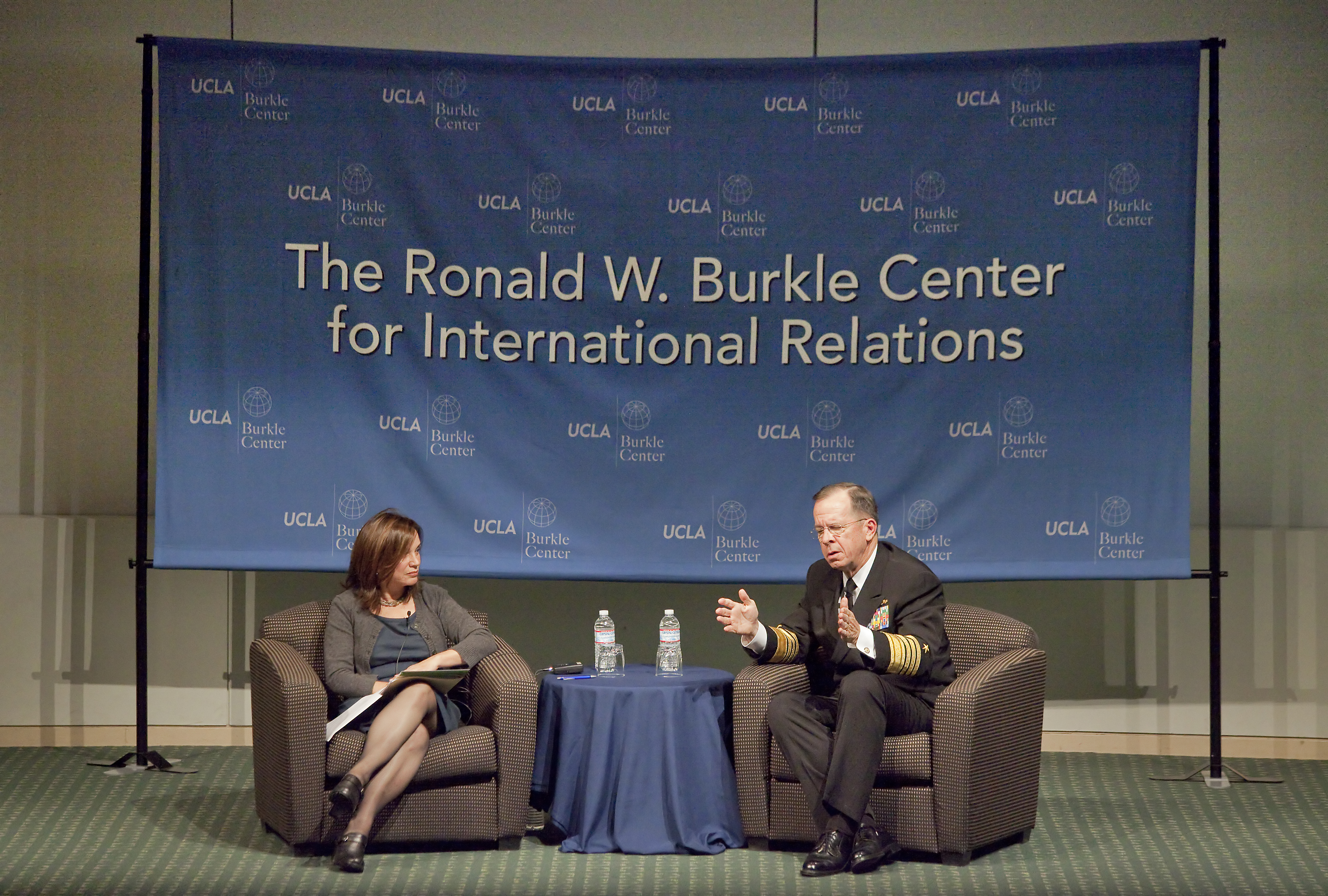Admiral Michael Mullen speaks at UCLA Burkle Center event with Renee Montagne

National Public Radio “Morning Edition” co-host Renee Montagne interviewed Admiral Michael Mullen, Chairman of the Joint Chiefs of Staff, at the UCLA Anderson School of Management on Wednesday.
By Elizabeth Case
Nov. 12, 2010 12:23 a.m.

Admiral Michael Mullen spoke at UCLA on Wednesday as part of the Bernard Brodie Distinguished Lecture Series on the Conditions of Peace.
Correction: In the original online headline for this article, Renee Montagne’s name was misspelled.
Seated casually in two oversized armchairs, Admiral Michael Mullen and National Public Radio “Morning Edition” co-host Renee Montagne looked more like they were sharing a meal than sharing war stories at the UCLA Anderson School of Management on Wednesday.
But the informal setting contrasted with the issues at hand. Montagne asked Mullen, chairman of the Joint Chiefs of Staffs, questions about everything from the U.S.’s presence in the Middle East to the proposed nuclear weapons treaty between the United States and Russia.
Mullen’s appearance was a part of the Bernard Brodie Distinguished Lecture Series on the Conditions of Peace, a program organized by the Burkle Center of International Relations to bring experts on politics, strategy, warfare and peace to UCLA. The talk gave students the opportunity to hear firsthand about the war on terrorism and other military policies from America’s highest-ranking officer in the U.S. Armed Forces.
Chancellor Gene Block and UCLA School of Law professor Kal Raustiala introduced Mullen and Montagne to a crowd of about 400.
The program began with a discussion about U.S. involvement in Afghanistan.
Mullen compared the situation there to that of a “starving man,” saying that before late 2009, operations in Afghanistan were under-supported strategically, financially and publicly.
“You can’t just feed someone who has been starving for a long time a full meal and expect them to bounce back overnight,” Mullen said.
The admiral said the U.S. intends to begin removing troops from Afghanistan in July 2011, though he warned that the U.S. would continue to have a presence there for a long time. The number of troops withdrawn will depend on conditions on the ground and recommendations from General David Petraeus.
The admiral also discussed the situation in Pakistan, where he has been working closely with local leadership to root out local Taliban, al-Qaeda and other insurgent groups believed to be occupying North Waziristan, a region near the border of Afghanistan that Mullen called the “epicenter of terrorism in the world.”
Relations have been strained with Pakistan since 1990, when the United States suspended promised military assistance and economic aid, but trust between the two countries is being successfully rekindled, Mullen said.
“We are not there to stay. We are not there to take over the nuclear weapons. We are there for one reason, and that is to support the Pakistani government, the Pakistani people and the Pakistani military,” Mullen said in response to a question from the audience.
Other points highlighted in the conversation included the state of relations with Iran and veterans’ affairs. As Thursday was Veterans Day, Mullen spoke about his hopes for increased support for veterans.
“As I have traveled, I have been concerned about how much America really knows about the men and women that serve, and the sacrifices they and their families make,” he said.
Mullen said the U.S. military is generating more homeless veterans now than it did during the Vietnam War. Women veterans are especially vulnerable because certain issues they face, like sexual harassment, may not be adequately addressed by all Veterans Affairs offices. According to NPR, clinics are working to provide more gender-specific care.
Though the lecture covered many controversial topics, there was little discussed that Mullen had not already made public.
Charly Baker, a first-year undeclared student, said he had hoped Mullen would talk more about U.S. efforts toward ending the war.
“I would have liked him to talk (more) about peacekeeping around the world … and future concerns rather than present facts,” Baker said.
Jonathan Dawson, a second-year law student and president of the UCLA Veteran’s Law Society, said he was excited about Mullen’s support to repeal the military’s Don’t Ask, Don’t Tell policy. Mullen testified against the policy earlier this year and said Wednesday that he hopes the policy will change through congressional action.
“If the military leaders are backing it, if the president is backing it, if the judiciary is backing it, then it is time for Congress to do the same,” Dawson said.

